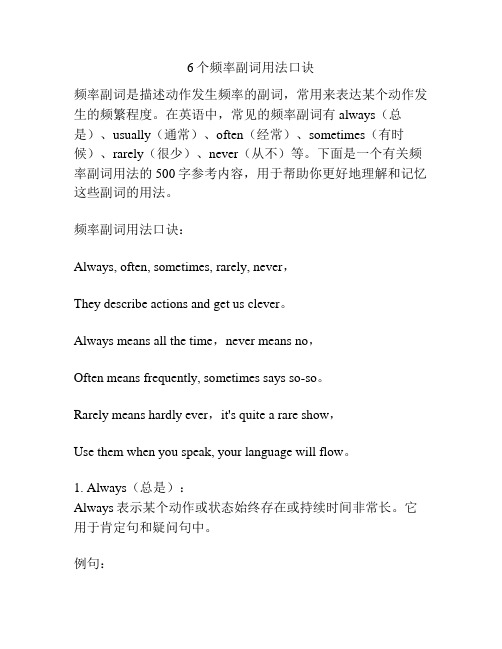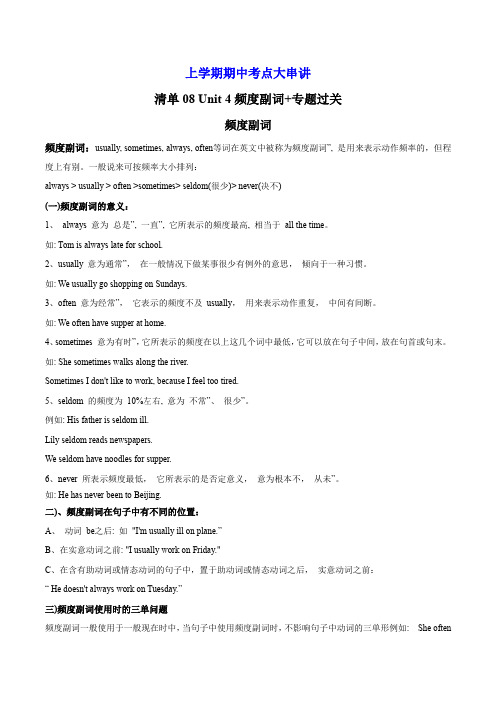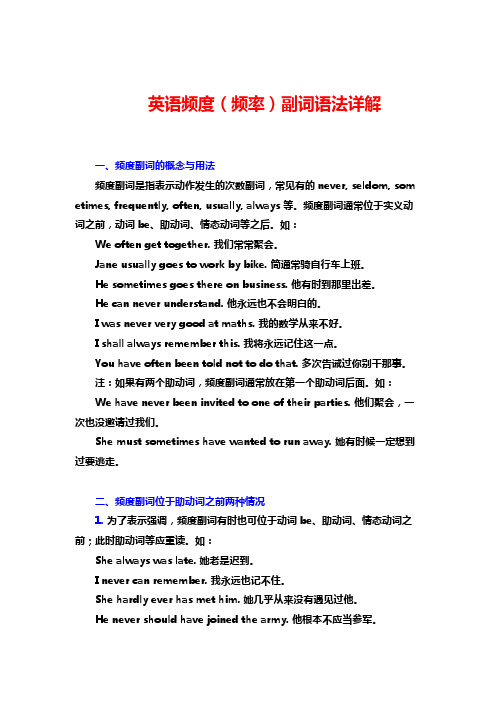英语频度副词复习要点(大全)
【高中英语】高中英语知识点:频度副词

【高中英语】高中英语知识点:频度副词频度副词的概念:频度副词表示动作发生的次数,常见的有ever,never,rarely,seldom,once,often,occasionally,constantly,frequently,usually ,continually,always等。
频率副词的特点:频度副词表示动作发生的次数,常见有的ever,never,rarely,seldom,once,often,occasionally,constantly,frequently,usually ,continually,always等。
在副词的位置:频度副词通常位于实义动词之前,动词be、助动词、情态动词之后:heisseldomlateforschool。
他上学很少迟到。
有时为了强调,频度副词也可位于动词be、助动词等之前:她总是迟到。
有的频度副词可位于句末(尤其受very,only修饰时):我通常在周五领工资。
wegooutveryseldom.我们绝少外出。
你是不是有过这样的经历?你经常去看电影吗?有的频度副词(如sometimes,often,usually,frequently,occasionally等)可位于句首(此时多半是因为强调或对比):有时他乘周末的公共汽车去那里。
veryoftenthephoneringswheni'minthebath.电话经常在我洗澡时响。
笔记:含有否定意义的副词置于句首时,其后要用倒装语序:我从未去过那里。
seldomdoesheseeafilm.他很少看电影。
此外,频率副词always和never通常不在句首,除非是祈使句:如:alwaysrememberthis.时刻记住这一点。
永远不要在晚上。
晚上不要出去。
频度副词在否定句中的位置:在否定句中,一些频率副词可以位于否定词not之后或之前(例如,通常,经常),一些频率副词必须位于否定词之后(例如,总是,一贯,持续,持续),而一些频率副词必须位于否定词not之前(例如,有时,经常):heissometimesnotresponsibleforwhathedoes.他有时对他所做的事不负责任。
人教PEP六年级英语上册 频度副词用法总结

频度副词用法总结一、usually, sometimes, always, often等词在英文中被称为“频度副词”,是用来表示动作频率的,即在一定的时间内动作重复发生或状态重复出现的次数。
一般说来可按频率大小排列:always>usually>often>sometimes>seldom(很少)>never(决不)always(100%) usually(80%) often (30-50%)sometimes(20%) hardly ever(5%) never(0%)二、频度副词的位置1. 在be动词之后。
如:She is sometimes very busy. 她有时很忙。
2. 在第一个动词或情态动词之后。
如:I will never forget the first time I met you. 我将永远忘不了和你的第一次见面。
3. 在实义动词之前。
如:We often go there. 我们常去那儿。
4. sometimes也可放在句首、句中或句末,often也可放在句末。
如:Sometimes she writes to me. 她有时候给我写信。
She writes to me often. 她经常给我写信。
三、用法1. often, always, usually等通常和一般现在时连用,表示现在经常或反复发生的动作。
如:It often rains here in April. 这儿四月份常下雨。
2. always与进行时连用时,并不强调动作正在进行,而是表示赞叹、厌烦等情绪。
如:He is always thinking of others. 他总是想着别人。
(赞叹)She is always asking silly questions. 她老是问些愚蠢的问题。
(厌烦)3. 对这些频度副词提问时,用how often。
如:I write to my brother sometimes.How often do you write to your brother?一、频度副词的意义:1、always 意为“总是”,“一直”,它所表示的频度最高,相当于all the time。
6个频率副词用法口诀

6个频率副词用法口诀频率副词是描述动作发生频率的副词,常用来表达某个动作发生的频繁程度。
在英语中,常见的频率副词有always(总是)、usually(通常)、often(经常)、sometimes(有时候)、rarely(很少)、never(从不)等。
下面是一个有关频率副词用法的500字参考内容,用于帮助你更好地理解和记忆这些副词的用法。
频率副词用法口诀:Always, often, sometimes, rarely, never,They describe actions and get us clever。
Always means all the time,never means no,Often means frequently, sometimes says so-so。
Rarely means hardly ever,it's quite a rare show,Use them when you speak, your language will flow。
1. Always(总是):Always表示某个动作或状态始终存在或持续时间非常长。
它用于肯定句和疑问句中。
例句:- She always wears a hat when she goes out.她出门时总是带着帽子。
- Do you always eat breakfast before work?你上班前总是吃早餐吗?2. Often(经常):Often表示某个动作或状态频繁地发生。
它在肯定句中的位置通常在行为动词之前,be动词之后。
例句:- I often go to the gym after work.我经常下班后去健身房。
- They often play basketball on weekends.他们经常在周末打篮球。
3. Sometimes(有时候):Sometimes表示某个动作或状态偶尔发生,不是经常性的。
清单08U4频度副词语法专题过关【考点清单】

上学期期中考点大串讲清单08 Unit 4频度副词+专题过关频度副词频度副词:usually, sometimes, always, often等词在英文中被称为频度副词”, 是用来表示动作频率的,但程度上有别。
一般说来可按频率大小排列:always > usually > often >sometimes> seldom(很少)> never(决不)(一)频度副词的意义:1、always 意为总是”, 一直”, 它所表示的频度最高, 相当于all the time。
如: Tom is always late for school.2、usually 意为通常”,在一般情况下做某事很少有例外的意思,倾向于一种习惯。
如: We usually go shopping on Sundays.3、often 意为经常”,它表示的频度不及usually,用来表示动作重复,中间有间断。
如: We often have supper at home.4、sometimes 意为有时”,它所表示的频度在以上这几个词中最低,它可以放在句子中间,放在句首或句末。
如: She sometimes walks along the river.Sometimes I don't like to work, because I feel too tired.5、seldom 的频度为10%左右, 意为不常”、很少”。
例如: His father is seldom ill.Lily seldom reads newspapers.We seldom have noodles for supper.6、never 所表示频度最低,它所表示的是否定意义,意为根本不,从未”。
如: He has never been to Beijing.二)、频度副词在句子中有不同的位置:A、动词be之后: 如"I'm usually ill on plane.”B、在实意动词之前: "I usually work on Friday."C、在含有助动词或情态动词的句子中,置于助动词或情态动词之后,实意动词之前:“ He doesn't always work on Tuesday.”三)频度副词使用时的三单问题频度副词一般使用于一般现在时中,当句子中使用频度副词时,不影响句子中动词的三单形例如: She oftengoes to school by bike.四)对频率副词提问要用how often,意思是多久(一次)例: How often do you go to the library?Sometimes./Once a week.【专题过关】一、单项选择1.—Would you like some coffee?— No, thanks. I ________ drink coffee.A.always B.often C.usually D.never 2.— Do you often exercise, Jason?— No, ________. I don’t like sports at all.A.usually B.often C.never D.always 3.—Do you want to drink some cola?—No, thanks. I _________ drink it because it’s not healthy.A.never B.sometimes C.usually D.always 4.Daming’s mother ________ makes a birthday cake. She usually buys one.A.always B.usually C.often D.never 5.Tom is ________ free on Saturday, so he can play basketball with us every weekend.A.never B.sometimes C.always D.seldom 6.— My father ________ smokes.— That’s very good for his health.A.always B.sometimes C.usually D.never7.I ________ eat too much chocolate because it’s unhealthy.A.sometimes B.often C.always D.never 8.John _________ gets up early so he is _________ late for school.A.seldom; never B.never; seldomC.always; seldom D.often; sometimes9.Mary lives far from her office, but she is _________ late for work.A.always B.never C.often D.usually 10.Mr. Zhang is _________ very busy with his business, so he _________ has time to play.A.sometimes, never B.always, sometimesC.usually, often D.always, seldom11.—How often do you clean your bedroom, Zhenhui?—________. My mother often does it.A.Always B.Often C.Usually D.Seldom 12.I _________ go to school by bike, but when it rains I go to school by bus.A.usually B.sometimes C.hardly D.never 13.—Do you know about the NBA player Jeremy Lin, Nancy?—Oh, I don’t know him. I _________ watch basketball matches.A.often B.always C.sometimes D.seldom 14.My mum is very busy so she ________ watches TV.A.often B.always C.seldom D.almost 15.— Do you often go climbing, Tina?— No, ________. I don’t like it at all.A.always B.usually C.often D.seldom 16.I don’t like football at all. I _________ play it.A.sometimes B.never C.often D.always 17.We usually have dinner at home in the evening, but we ________ eat out.A.sometimes B.seldom C.never D.always 18.—Do you _______ walk to school?—No, _______. I live too far away.A.often, never B.usually, oftenC.seldom, always D.always, usually19.I ________ walk to school, but this morning I rode a mobike because I got up late.A.never B.sometimes C.usually D.once 20.Amy doesn’t like singing, so she _________ sings at a party.A.always B.often C.sometimes D.never 21.I ________ watch the TV programme. It’s very interesting.A.often B.never C.hardly D.seldom 22.—Do you often go to the sports centre?—No, ________. I don’t like sports at all.A.always B.never C.sometimes D.usually23.He left his hometown and ________ went back again. He missed it very much.A.never B.usually C.often D.always24.— Does Sam guess the meanings of English words?— He is lazy. He ________ guesses the meanings of new words. He uses his dictionary all the time.A.usually B.sometimes C.always D.never25.— How often does your mother help you clean your room?— ________. I do it myself.A.Seldom B.Always C.Never D.Usually26.Time to say goodbye. But I will ________ forget the days we spent together.A.always B.often C.usually D.never27.These people are really nice. They ________ give you a hand.A.already B.never C.always D.seldom28.—Why does Dale ________ eat out?—Because he likes to eat with his family at home.A.never B.always C.usually D.often29.Mary ________ eats tofu because she thinks it is terrible.A.always B.never C.usually D.often30.David ________ plays puter games on school nights, because he always has a lot of homework to do.A.sometimes B.often C.usually D.never31.—Excuse me, where is the school library?—It’s in front of this building. You can find it _______.A.really B.easily C.differently D.usually32.Mr. Wang is ________ busy with his business, so he ________ has time for fun.A.always; seldom B.always; often C.usually; often D.never; neverA.sometimes B.seldom C.often D.always34.—________ do you go online(上网), Sam?—About once a month. I’m ________ busy with my lessons.A.How long; always B.How long; never C.How often; always D.How often;neverA.not often B.always C.usually D.never36.David doesn’t like coffee. He ________ drinks it.A.usually B.often C.never D.always37.Meimei is very busy these days, so she ___________ goes out to play.A.sometimes B.usually C.seldom D.always38.She lives far from school, but she is ________ late for class.A.always B.seldom C.often D.usually39.My sister and I ________ go to the park on Sunday.A.some time B.some times C.sometime D.sometimes40.I dislike playing basketball, so I ________ play it in my free time.A.sometimes B.often C.usually D.never41.Sweet snacks have too much sugar, so Simon ________ eats them.A.always B.seldom C.often D.usually42.My father likes football but he ________ plays it. He only ________ football matches on TV!A.always; watch B.never; watches C.often; watched D.usually; will watch43.My brother has a healthy living habit. He ________ stays up late, and he is an early bird.A.hardly B.always C.usually D.often44.Betty’s home is far from Fun Times Park, so she ________ walks there.A.seldom B.usually C.often D.sometimes45.Peter lives far from school but he is ________ late.A.often B.always C.seldom D.sometimes46.Tom gets up early, and he is ________ late for classes.A.always B.often C.usually D.seldom47.My parents ________ encourage me to face the trouble in my life.A.never B.seldom C.always D.soon48.Bob doesn’t like coffee very much, so he ________ drinks it.A.always B.usually C.often D.seldom49.—Does your brother often go shopping with you?—No, ________. He doesn’t like shopping at all.A.always B.usually C.never D.sometimes 50.—I often see your dog here after school, Tom.—Ha! He ________ es here and waits for me to go home.A.also B.always C.too D.never参考答案:1.D【详解】句意:——你想要一些咖啡吗?——不,谢谢。
【高中英语】高中英语知识点:频度副词

【高中英语】高中英语知识点:频度副词频度副词的概念:频度副词表示动作发生的次数,常见的有ever,never,rarely,seldom,once,often,occasionally,constantly,frequently,usually ,continually,always等。
频率副词的特点:频度副词表示动作发生的次数,常见有的ever,never,rarely,seldom,once,often,occasionally,constantly,frequently,usually ,continually,always等。
在副词的位置:频度副词通常位于实义动词之前,动词be、助动词、情态动词之后:heisseldomlateforschool。
他上学很少迟到。
有时为了强调,频度副词也可位于动词be、助动词等之前:她总是迟到。
有的频度副词可位于句末(尤其受very,only修饰时):我通常在周五领工资。
wegooutveryseldom.我们绝少外出。
你是不是有过这样的经历?你经常去看电影吗?有的频度副词(如sometimes,often,usually,frequently,occasionally等)可位于句首(此时多半是因为强调或对比):有时他乘周末的公共汽车去那里。
veryoftenthephoneringswheni'minthebath.电话经常在我洗澡时响。
笔记:含有否定意义的副词置于句首时,其后要用倒装语序:我从未去过那里。
seldomdoesheseeafilm.他很少看电影。
此外,频率副词always和never通常不在句首,除非是祈使句:如:alwaysrememberthis.时刻记住这一点。
永远不要在晚上。
晚上不要出去。
频度副词在否定句中的位置:在否定句中,一些频率副词可以位于否定词not之后或之前(例如,通常,经常),一些频率副词必须位于否定词之后(例如,总是,一贯,持续,持续),而一些频率副词必须位于否定词not之前(例如,有时,经常):heissometimesnotresponsibleforwhathedoes.他有时对他所做的事不负责任。
英语频度(频率)副词语法详解

英语频度(频率)副词语法详解一、频度副词的概念与用法频度副词是指表示动作发生的次数副词,常见有的never, seldom, som etimes, frequently, often, usually, always 等。
频度副词通常位于实义动词之前,动词be、助动词、情态动词等之后。
如:We often get together. 我们常常聚会。
Jane usually goes to work by bike. 简通常骑自行车上班。
He sometimes goes there on business. 他有时到那里出差。
He can never understand. 他永远也不会明白的。
I was never very good at maths. 我的数学从来不好。
I shall always remember this. 我将永远记住这一点。
You have often been told not to do that. 多次告诫过你别干那事。
注:如果有两个助动词,频度副词通常放在第一个助动词后面。
如:We have never been invited to one of their parties. 他们聚会,一次也没邀请过我们。
She must sometimes have wanted to run away. 她有时候一定想到过要逃走。
二、频度副词位于助动词之前两种情况1.为了表示强调,频度副词有时也可位于动词be、助动词、情态动词之前;此时助动词等应重读。
如:She always was late. 她老是迟到。
I never can remember. 我永远也记不住。
She hardly ever has met him. 她几乎从来没有遇见过他。
He never should have joined the army. 他根本不应当参军。
2.在简略答语中,当频度副词与动词be、助动词或情态动词位于句末时,频度副词必须前置。
高中英语语法讲解:频度副词
高中英语语法频度副词语法点讲解1.意义:表示动作发生的次数、频率的副词。
always, sometimes, never,usually,often ...常用频度副词的频率排序:always 100%usually 90%normally 80%often 70%sometimes 50%occasionally 30%seldom 20%hardly ever 5%never 0%2. 频度副词出现的位置(用法):1.频度副词通常放在实意动词之前(1),be动词之后(2),如果句子中出现情态动词或助动词,则放在情态动词、助动词与实意动词之间(3)。
如:I always do homework in the afternoon.(1)He is never kind to us.(2)She can never know your secret.(3)2.频度副词的特殊位置:表示次数的频度副词,如once, twice,可以放在动词后或句末(4);有的频度副词也可放在句首表示强调(5)。
如:The car broke down twice.(4)Sometimes I go fishing with my dad.(5)3. 常用频度副词精讲:1. always 频率最高,表示动作重复、状态继续,表示“一直、总是”,其反义词为never。
always等与not连用时,表示部分否定。
如:The rich are not always happy. 有钱的人并不总是快乐的。
如果要变为否定句,应将always改为never才能全部否定。
如:Li Ping is always late for school. 李平上学总是迟到。
Li Ping is never late for school.(全部否定)Li Ping is not always late for school. (部分否定)频度副词通常和一般现在时连用,表示动作发生的频率。
中考英语频度副词考点归纳
中考英语频度副词考点归纳
中考英语频度副词的考点主要涉及对频度副词的理解和正确使用。
以下是中考英语中频度副词的考点归纳:
1. 频度副词的位置:频度副词通常放在连系动词、助动词或情态动词的后面,如“David is often arrives late for school.”(大卫上学经常迟到)。
频
度副词也可以放在行为动词之前,如“We usually go to school at 7:10 every day.”(我们每天经常在7:10去上学)。
有些频度副词可以放在句
首或句尾,用来表示强调,如“Sometimes I walk home, sometime I
ride a bike.”(有时我步行回家,有时我骑自行车)。
2. 常见频度副词:always(总是,一直)、usually(通常)、often(常常,经常)、sometimes(有时候)、never(从不)。
3. 注意事项:当“never”放在句首时,主语和谓语动词需要倒装,如“Never have I been there.”(我从没到过那儿)。
此外,还需要注意频度副词与时间状语的区别,如“always”与“forever”在语义和用法上的区别。
同时,对于一些易混淆的频度副词,如“always”与“never”,“usually”与“seldom”,需要特别注意其用法和含义。
以上归纳仅供参考,建议查阅教辅材料或咨询英语老师获取更准确的信息。
人教版英语八年级上册Unit2(语法全解):频度副词
频度副词的用法一、usually, sometimes, always, often等词在英文中被称为“频度副词”,是用来表示动作频率的,即在一定的时间内动作重复发生或状态重复出现的次数。
一般说来可按频率大小排列:always>usually>often>sometimes>seldom(很少)>never(决不)always(100%) usually(80%) often (30-50%)sometimes(20%) hardly ever(5%) never(0%)二、频度副词的位置1. 在be动词之后。
如:She is sometimes very busy. 她有时很忙。
2. 在第一个动词或情态动词之后。
如:I will never forget the first time I met you. 我将永远忘不了和你的第一次见面。
3. 在实义动词之前。
如:We often go there. 我们常去那儿。
4. sometimes也可放在句首、句中或句末,often也可放在句末。
如:Sometimes she writes to me. 她有时候给我写信。
She writes to me often. 她经常给我写信。
三、用法1. often, always, usually等通常和一般现在时连用,表示现在经常或反复发生的动作。
如:It often rains here in April. 这儿四月份常下雨。
2. always与进行时连用时,并不强调动作正在进行,而是表示赞叹、厌烦等情绪。
如:He is always thinking of others. 他总是想着别人。
(赞叹)She is always asking silly questions. 她老是问些愚蠢的问题。
(厌烦)3. 对这些频度副词提问时,用how often。
如:I write to my brother sometimes.How often do you write to your brother?一、频度副词的意义:1、always 意为“总是”,“一直”,它所表示的频度最高,相当于all the time。
小学英语知识点:频度副词
小学英语知识点:频度副词频度副词:usually, sometimes, always, often等词在英文中被称为“频度副词”。
用来表示动作频率,但程度上有别。
常见频度副词按频率大小排列如下:always(100%)usually(80%)often(60%)sometimes (40%)seldom(20%)hardly(10%) never(0%)频度副词用法列举:◆always 频率最高,表示动作重复、状态继续,表示“一直、总是”,其反义词为never。
always等与not连用时,表示部分否定。
如:The rich are not always happy. 有钱的人并不总是快乐的。
如果要变为否定句,应将always改为never才能全部否定。
如:Li Ping is always late for school. 李平上学总是迟到。
Li Ping is never late for school. 李平上学从不迟到。
(全部否定)Li Ping is not always late for school. 李平上学不总是迟到。
(部分否定)频度副词通常和一般现在时连用,表示动作发生的频率。
但always与进行时连用时,并不强调动作正在进行,而是表示赞叹、厌烦等情绪。
如:He is always thinking of others. 他总是想着别人。
(赞叹)She is always asking silly questions. 她总是问些愚蠢的问题。
(厌烦)The boy is always asking for money. 这个小男孩总是要钱。
(厌烦)◆usually意为“通常”,表示习惯性动作或状态,很少有例外。
如:We usually go to school at seven in the morning. 我们通常在早上七点上学。
My mother and I usually go shopping on Sundays. 我和妈妈通常在星期天去买东西。
- 1、下载文档前请自行甄别文档内容的完整性,平台不提供额外的编辑、内容补充、找答案等附加服务。
- 2、"仅部分预览"的文档,不可在线预览部分如存在完整性等问题,可反馈申请退款(可完整预览的文档不适用该条件!)。
- 3、如文档侵犯您的权益,请联系客服反馈,我们会尽快为您处理(人工客服工作时间:9:00-18:30)。
英语频度副词复习要点(大全)本站特作约作者唐小舟一、频度副词的概念与用法频度副词是指表示动作发生的次数副词,常见有的n ever, seldom, sometimes, frequently, often, usually, always 等。
频度副词通常位于实义动词之前,动词b e、助动词、情态动词等之后。
如:We often get together. 我们常常聚会。
Jane usually goes to work by bike. 简通常骑自行车上班。
He sometimes goes there on business. 他有时到那里出差。
He can never understand. 他永远也不会明白的。
I was never very good at maths. 我的数学从来不好。
I shall always remember this. 我将永远记住这一点。
You have often been told not to do that. 多次告诫过你别干那事。
注:如果有两个助动词,频度副词通常放在第一个助动词后面。
如:We have never been invited to one of their parties. 他们聚会,一次也没邀请过我们。
She must sometimes have wanted to run away. 她有时候一定想到过要逃走。
二、频度副词位于助动词之前两种情况1.为了表示强调,频度副词有时也可位于动词b e、助动词、情态动词之前;此时助动词等应重读。
如:She always was late. 她老是迟到。
I never can remember. 我永远也记不住。
She hardly ever has met him. 她几乎从来没有遇见过他。
He never should have joined the army. 他根本不应当参军。
2.在简略答语中,当频度副词与动词b e、助动词或情态动词位于句末时,频度副词必须前置。
如:“Philip is late again.” “Yes, he always is.”“菲利普又迟到了。
”“是的,他总是迟到。
”“Can you park your car near the shops?” “Yes. I usually can.” “你可以在商店附近停车吗?”“是的,通常可以。
”I know I should take exercise, but I never do. 我知道我应该进行体育锻炼,但我从来没这样做过。
三、频度副词位于句首的用法1.sometimes常可用于句首。
如:Sometimes she comes late. 有时她来得晚。
Sometimes she didn’t agree with me. 有时她和我意见不一致。
Sometimes we get a lot of rain in August. 有时在8月份雨水很大。
2.often用于句首时,通常表示强调,且其前一般有q uite, very修饰。
如:Very often he comes in late. 他常常迟到。
Quite often the phone rings when I’m in the bath. 电话经常在我洗澡时响。
ually有时也用于句首,其前不用修饰语。
如:Usually I get up early. 我平时起得早。
Sometimes he comes by bus, but usually he comes by taxi. 有时他坐公共汽车来,不过他通常还是打的来。
Usually cooking pots have two small handles but pans have one long handle. 通常地深底煮锅有两只把手而平底锅只有一个长长的把手。
4.always一般不用于句首,除非是用在祈使句中。
如:Always remember this. 请时刻记住这一点。
Always look in the mirror before starting to drive. 一定要先看看反光镜再开车。
另外,n ever也可用于祈使句的句首。
如:Never tell him the news. 千万不要告诉他这消息。
Never ask her about her marriage. 决不要问她结婚的事。
5.在正式文体中,表示否定意义的副词s eldom, never可位于句首,但此时其后要用倒装语序。
如:Seldom has there been such a happy meeting. 过去很少有过这样愉快的会议。
Never did he think the book would be finished so soon. 他可没想到这本书会这么快看完。
四、频度副词位于句末的用法1.sometimes常可用于句末。
如:We all get into trouble sometimes. 我们有时都会遇到麻烦。
You can’t work all the time—it doe s you good to go out a nd enjoy yourself sometimes. 你不能总是工作,有时出去放松一下会对你有好处。
2.often有时可置于句末,但通常会带有v ery, quite, fairly, more, so等修饰语。
如:We’ve been there quite often. 我们经常去那里。
I wish he would write more often. 我多希望他肯常写信来。
When I was young, I used to play tennis very often. 我年轻时经常打网球。
Diana used to travel a lot. These days she doesn’t go away so often. 戴安娜过去经常旅游。
最近她不常出门了。
We’re not exactly on intimate terms, but we see each other fairly often. 我们虽算不上关系密切,但还常见面。
注:有时也可不带修饰语,但主要见于否定句或疑问句。
如:He writes to me often. 他经常给我写信。
Do you come here often? 你常来这儿吗?I don’t come here often. 我不常来这儿。
ually有时也用于句末,其前不用修饰语。
如:I’m not late, usually. 我通常不迟到。
I get paid on Fridays usually. 我通常在星期五领工资。
4.seldom 一般不用于句末,除非其前带有o nly, very等修饰。
如:We go out very seldom. 我们绝少外出。
I play basketball very seldom indeed. 我很少打篮球。
5.always一般不用于句末,偶尔用于句末,此时它不表法“总是”,而表示“永远”。
如:I’ll love you always. 我将永远爱你。
另外,有时用于句末是因为句子有所省略的缘故。
如:Generally they walked together on Sunday, but not always. 他们一般在星期日一起散步,但并不总是如此。
句中的b ut not always=but they didn’t always walk together on Sunday。
五、频度副词在否定句中的用法在否定句中,有的频度副词位于否定词之前或之后均可,而有的频度副词则必须位于否定词之后,而还有的频度副词却必须要位于否定词。
大致情况如下:1.频度副词u sually和o ften可位于否定词n ot之前或之后。
如:他们不常开这样的晚会。
正:T hey don’t often hold such parties.正:T hey often don’t hold such parties.星期日我们一般不在9点以前起床。
正:W e don’t usually get up before nine on Sundays.正:W e usually don’t get up before nine on Sundays.在否定句中,频度副词用于句中或句首,有时但会导致意思不同。
如:He doesn’t usually sleep for two days at a time. 他很少一连睡两天。
Usually he doesn’t sleep for two days at a time. 他连续两天不睡觉是常事。
2.频度副词a lways总是位于否定词之后,不可位于否定句之前。
如:Things are not always what they seem to be. 外表往往是靠不住的。
Silence must not always be read as consent. 沉默并不见得一定意味着同意。
We thoroughly understand each other, even if we don’t always agree. 我们彼此非常了解,虽然有时候也有一些分歧。
3.频度副词s ometimes总是位于否定词之前,不可位于否定词之后。
如:Jim is sometimes not very punctual. 吉姆有时不太准时。
He is sometimes not satisfied with my work. 他有时对我的工作不满意。
Debbie is sometimes not responsible for what she does. 戴比有时对她所做的事不负责任。
六、如何对频度副词提问对频度副词提问,英语通常用h ow often。
H ow often的本意是“多经常”,通常译为“多久”“隔多久”。
如:How often do you wash your hair? 你多长时间洗一次头发?How often do you go to church? 你隔多久去做一次礼拜?How often do you have a bad back? 你多长时间腰痛一次?How often do the buses run? 公共汽车隔多长时间一班?How often do you hear from your sister? 你多长时间接到你姐姐一次信?。
